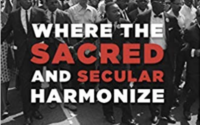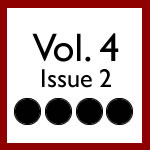Volume 8.2: Contested Publics
This issue of Present Tense, Issue 2 from Volume 8, marks ten years from our first issue back in 2010. Over that time, we’re proud to have published numerous articles that address how rhetoric is created, cultivated, and deployed in the public sphere — and this issue is no different. Showcasing the many intersections of public rhetoric, current controversies, and effective pedagogy, the authors in this issue of Present Tense bring to light some remarkable instances of persuasive techniques and offer nuanced critiques of those moments in less than 2,500 words.
This issue also marks the final one for us (Ehren and Megan) as Co-Managing Editors. We’ve been doing this rewarding and challenging work for about eight years now, but are ready to pass it along to another pair of wonderful co-Managing Editors: Jessica Clements, an Associate Professor and currently a Style Editor for Present Tense, and John Pell, an Associate Professor of rhetoric and composition and Associate Dean. Both are at Whitworth University’s English Department, which has sponsored Present Tense since 2018. We’ll both still be involved in Present Tense, though in different positions.
As Co-Managing Editor, Ehren has deeply enjoyed being able to connect with so many scholars, both emerging and established, in the field of rhetoric and composition. This work has been rewarding and challenging in equal measure, and while he’s moving on to become an Editor-at-Large, he still relishes the idea of being connected with the Present Tense community. He’d like to thanks all of his fellow editors, both past, present, and future, for the time, attention, and thought they give to the complex issues related to publishing so many researchers in the field.
Megan has thoroughly enjoyed watching the journal develop and working with the expanding Present Tense family of editors, reviewers, and authors over the years. Most exciting for her has been those moments when an author has been inspired by the helpful guidance of thoughtful reviewers to turn an already strong piece into a truly insightful contribution to the field within the constraints of our shortened format. Like Ehren, she will not be leaving Present Tense but returning to her original role as a Style Editor.
We hope you enjoy reading/viewing these works and sharing them with colleagues and students in the months and years to come.
Johanna Phelps’ article “Common Rule Vulnerabilities: Practices, Pedagogies, and Effective Public Deliberative Rhetoric” considers the federal policy that governs research with human participants at federally funded organizations, and explains how “Public comment on the proposed revision changed the shape of the final policy to ensure that individuals with physical disabilities are better able to advocate for their own autonomy.”
Jordan Frith’s “Pushing Back on the Rhetoric of “Real” Life” tackles a different issue — that of how the phrase “in real life” and asks our fields to “interrogate the seemingly mundane terms we use when we talk about online life.”
In “A Rhetoric of 心 (Heart) and Liberal Democracy,” Tyler Carter argues that Chinese word 心 (xīn), commonly translated as “heart,” “challenges the epistemological divides present in American and, more broadly, Western Liberal Democracies and can also be seen at work in the recent emergence of American identity politics.”
Jenna Vinson and Clare Daniel’s “Power to Decide” Who Should Get Pregnant: A Feminist Rhetorical Analysis of Neoliberal Visions of Reproductive Justice” engage in a “feminist rhetorical analysis that entails critically interrogating how audiences are prompted to accept particular ways of knowing or believing that sustain systems of domination related to reproduction.”
Rich Shivener’s “Pressurized Rhetorical Bodies: Student-Athletes between Feeling Rules and Affective Publics” analyzes student-athletes’ rhetorical activity by examining a university handbook for student-athlete decorum. He argues that it “chills student-athletes’ negative talk and enacts what Arlie Hochschild and Adia Wingfield define as feeling rules.”
In “The Law-Abiding Citizen as Ideobody,” Dana Comi interrogates the power of the concept of a “law-abiding citizen” and explores how the term “ideobody” was used and abused during a committee hearing on House Bill 2074 (HB-2074).
Brian Bailie’s “So, Richard Spencer Is Coming to Your Campus. How He Was Allowed on, and How You Can Confront Him” considers the intersections of fee speech absolutism and economics in confrontations over highly contested speakers, and suggests how to “better represent the values hoped for on university campuses.”
Daniel Kenzie reviews three books: Jay Dolmage’s Disabled Upon Arrival: Eugenics, Immigration, and the Construction of Race and Disability (2018), Melanie Yergeau’s Authoring Autism: On Rhetoric and Neurological Queerness (2018), and George Estreich’s Fables and Futures: Biotechnology, Disability, and the Stories We Tell Ourselves (2019).
Matthew Miller reviews Mari Lee Mifsud’s Rhetoric and the Gift: Ancient Rhetorical Theory and Contemporary Communication (2015).
Katie W. Powell reviews David Holmes’ Where the Sacred and the Secular Harmonize: Birmingham Mass Meeting Rhetoric and the Prophetic Legacy of the Civil Rights Movements (2017).
Ehren Helmut Pflugfelder, Managing Editor
Megan Schoen, Managing Editor
Caitlan Spronk, Technical Editor
Shreelina Ghosh, Multimedia Editor
Matt Cox, Annotated Bibliography Editor
Don Unger, Social Media Editor
Ryan Skinnell, Review Editor
Joshua Prenosil, Business Editor
Jessica E. Clements, Style Editor
Cristyn L. Elder, Style Editor
John Williford, Design Editor



